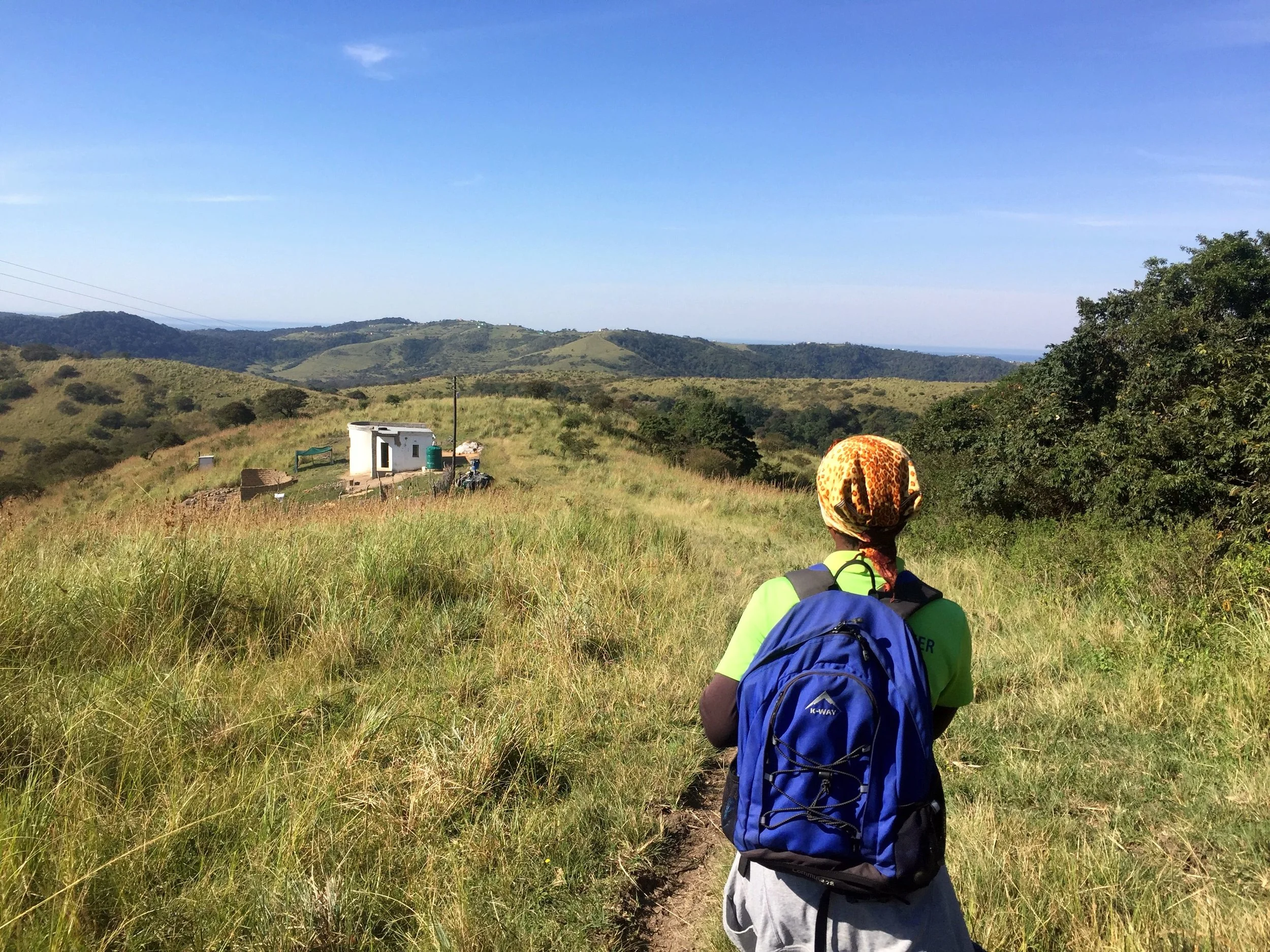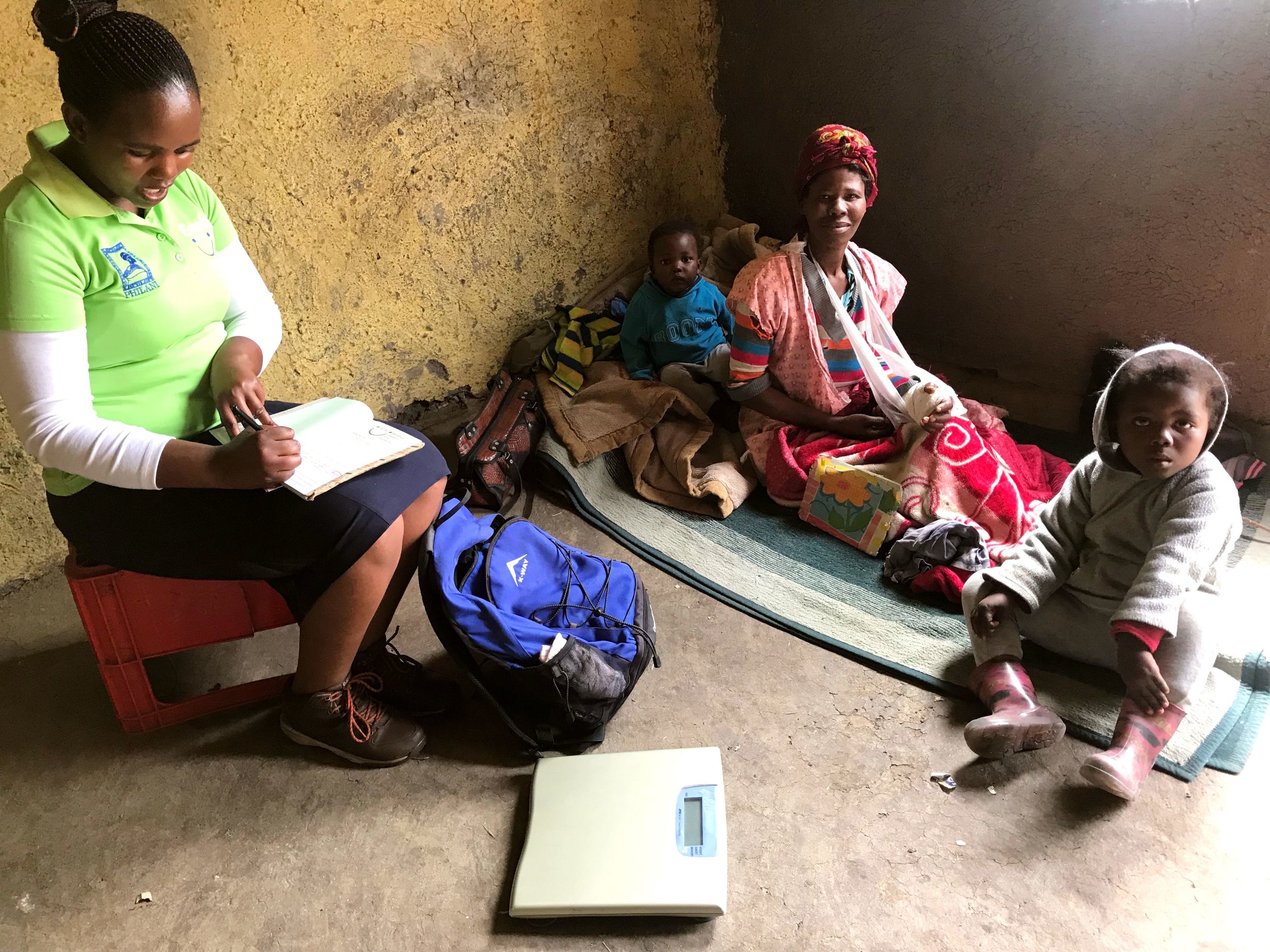Miranda Prynne documents her insights from her educational trip to see our Enable project in action.
I am sitting on a wooden bench in a draughty clay-built hut with a packed mud floor. There are no windows but a cold wind rattles through the gaps between the walls and corrugated iron roof. A second narrow wooden bench, small battered cupboard and mattress heavy with blankets constitutes the furniture. A fire smoulders in the corner, its smoke stinging the eyes. This basic shelter is home to a heavily pregnant mother, her husband and their two growing children. A couple of skinny pigs rootle in the dirt outside.
It is a scene of stark poverty. Yet, sitting shivering quietly on that wooden bench, I feel a rush of hope – and hope is a valuable currency. Hope leads to action.
I am in South Africa’s rural Eastern Cape, one of the most beautiful but deprived regions in a country of extremes. This is a world away from the stuccoed suburban palaces of Johannesburg and Cape Town.
We are visiting the expectant mother with the One to One Children’s Fund, a charity that is revolutionising healthcare in the remote Xhosa communities of Coffee Bay.
The Problem
These rambling hilltop villages on the Wild Coast of the former Transkei Republic are beset with health issues – high infant mortality, malnutrition, HIV, TB and more.
Healthcare is hard to come by in an area where you must travel many miles on foot to reach a clinic or hospital. Once there, there is no guarantee the drugs you need will be available due to widespread shortages. Many people here have no ID papers as their births were never registered making access to government services even more problematic. HIV is still stigmatised forcing people to hide their antiretrovirals or worse, give up taking them.
Our Solution
One to One’s Enable project targets the most vulnerable – expectant mothers and children up to the age of five – through door to door visits.
But it is not white male doctors with a dozen qualifications to their advising these women. This project relies on the local women themselves to assess and support their peers.
It is a simple model and it works. A select group of women from the Xhosa communities are trained as ‘Mentor Mothers’ equipping them with the skills and knowledge they need to carry out basic health checks.
The women travel around their local villages to identify mothers-to-be and young children most at risk. They arrange regular visits to monitor their health, provide support and advice and, if further medical care or drugs are required, refer them on to a clinic. Where needed, they can help with transport.
The key aim was to dramatically reduce under-five infant mortality and illness with a focus on preventing mother-to-child transmission of HIV, improving nutrition, raising immunisation rates and supporting good maternal mental health.
Just 18 months in, the Enable project’s Mentor Mothers have worked with 4,692 mothers, babies and young children, reduced HIV mother to child transmission rates to less than one per cent in target households, increased attendance of antenatal appointments by 20 per cent, increased adherence to antiretroviral treatment by 25 per cent and rehabilitated 75 per cent of underweight babies.
Good health is the starting point
“The first few years of a child’s life are the most critical,” explains David Altschuler, co-founder and chair of the One to One Children’s Fund which works to transform the lives of vulnerable children all over the world.
In South Africa under-five infant mortality remains very high. Studies show that without intervention, one in three babies born to HIV positive mothers will contract the virus either in the womb, at birth or while being breastfed. In a region where about 29 per cent of pregnant women are living with HIV this is a huge problem.
Even when uninfected with HIV, children born to mothers who carry the virus are twice as likely to die before reaching their first birthday. They are at higher risk of severe infection and suffer a higher rate of premature birth than those with mothers free of HIV. This is where the ongoing health checks and advice are vital.
Too few women attend antenatal checks due to poverty, lack of knowledge and cultural taboos which is why we are taking the checks directly to them to protect both mother and baby.
“Good health is the starting point to enable any child to become physically and mentally resilient, access education and do well later in life.”
Thanks to the Mentor Mothers, health issues are spotted early. Referrals, medical care and drugs get to the right people. The local women have someone they know and trust who they can contact for advice. Less people are dying since One to One came to Coffee Bay.
In an area rife with unemployment, many men move away to seek work in towns and cities leaving the family units and communities reliant on the women. Many of these men become infected with HIV and return to their rural homes passing on the virus to their spouses. Yet their children’s survival depends upon the mother’s continued good health.
Empowering women
Alongside its primary objectives, the Enable project is a tale of female empowerment. The Mentor Mothers are local Xhosa women, their homes are no different to the homes they visit, they face the same challenges, the same health issues, the same worries about how best to feed and care for their young children as those of their patients. Many of them are HIV positive.
But the Mentor Mothers command respect. When you meet them, you quickly understand why. These are 30 powerful women.
They greet us at One to One’s head office in Mankosi, near Coffee Bay, with an eruption of song and dance. There is chanting, clapping, laughter. These women have jobs in an area where employment is a rare commodity. Through the training, they have learnt how to look after themselves and their own children better. They are helping improve and save lives in their communities. These women are proud of what they do and rightfully so.
“When I was younger, I always wanted to be a nurse,” one Mentor Mother Zanele tells me as she explains why she joined the programme.
“I have learnt so much from doing this. I have learnt how to look after my children better, about better nutrition. I used to think if I fed them enough rice that was okay, but I now know they also need vegetables for good nutrition. We encourage all the local women we work with to grow their own vegetables to improve their family’s diets.”
We joined Zanele and fellow Mentor Mother Vuyokazi on a visit to two homes, which is how I find myself sitting on that bench, watching a quiet consultation unfold.
The mother is nine-months pregnant, due any day, and is complaining of swelling in her legs and pain in her hips. She is 35 years old but looks a lot older. She is weighed, her blood pressure checked, she talks to Zanele and Vuyokazi as they update her files. She has their mobile numbers to ring if she needs any help. They advise her to ring the clinic if the pain in her hip gets worse and she must arrange to go to the clinic the moment she goes into labour. They hand her a sealed package containing antiseptic and wipes to clean the umbilical cord, just in case.
The advice from the Mentor Mothers is simple enough – breastfeed your babies, feed your children a varied diet with fruit and vegetables when possible, ensure your children are immunised, if you carry HIV, do not stop taking your antiretrovirals, ever.
Until meeting the Mentor Mothers, this expectant mother had no birth papers. As far as the South African government was concerned, she did not exist. This would have meant she could not register the birth of her new baby and apply for the child support grants she dearly needs.
The Mentor Mothers help with the paperwork. They help local women navigate the bureaucracy necessary to access government support. They provide the vital missing link between the government services and the Xhosa villagers.
Other members of our group met entire families whose livelihood had been saved from disaster by the early diagnosis and intervention of the Mentor Mothers. One party ended up making an emergency dash to the hospital after arriving to find a mother in labour.
the secret is simplicity
The simplicity of the Enable model is its secret. This is no glamorous vanity project. It is a practical, low-cost solution to a problem. A solution that, with the right backing, could be applied on a much wider scale through government community health workers to improve the wellbeing of millions of young children and mothers.
We were visiting as part of an education trip with the UBS Optimus Foundation, the Swiss bank’s philanthropic arm which raised £47.6 million in 2017 to improve the lives of 2.1 million vulnerable children worldwide. This is one of the projects they support.
The Optimus team take a strategic approach to their work to ensure the greatest possible impact for each penny donated. Every project the Optimus Foundation works with is carefully vetted. They challenge partner programs to prove efficacy, value, scalability and sustainability with just five per cent of applicants meeting their standards.
Still in its pilot phase, the Enable project is working with the University of Stellenbosch to collect and independently evaluate data on programme outcomes and other findings unearthed during the regular health checks.
This should provide the One to One Children’s Fund team with the evidence base it needs to raise a further £2 million to scale up Enable over the next three years and lobby government to roll out this model. The first HIV treatment project for children and their mothers, run by One to One in South Africa’s Western Cape, was adopted by the provincial government to benefit thousands more in the scale up of antiretroviral treatment.
change for good
The philanthropic and charity sectors are often criticised for being too emotionally led, too ego-driven, creating dependence and lacking the sort of practical business thinking and evaluation that is needed to build long-term sustainable schemes.
Global problems are so widespread, complex and embedded, it is easy for people to feel overwhelmed, powerless and ultimately give up. When faced with a task as momentous as improving global health most of us don’t know where or how to start. The answer is simple: somewhere, anywhere.
David and his team are not attempting to solve all the world’s ills. They have identified a cluster of problems among one particularly vulnerable group and have set out to deal with that. But by working to improve maternal and early childhood health, they are indirectly supporting thousands more. Already more than 36,905 community members have gained from Enable services.
The ripple effect of such a project is enormous. If children can reach key developmental milestones in good health, their vulnerability is reduced and they are far more likely to thrive later in life. Whole communities and ultimately nations could benefit.
That is why, as I sit in the shadowy hut, watching the tired mother haul herself up off the bed to receive basic health checks ahead of giving birth to her third baby, I’m flooded with hope and humility.
With each small step, lives are saved and enhanced. For me at least, there is no longer any excuse for inaction.
By Miranda Prynne
This project is funded by UBS Optimus Foundation UK.





